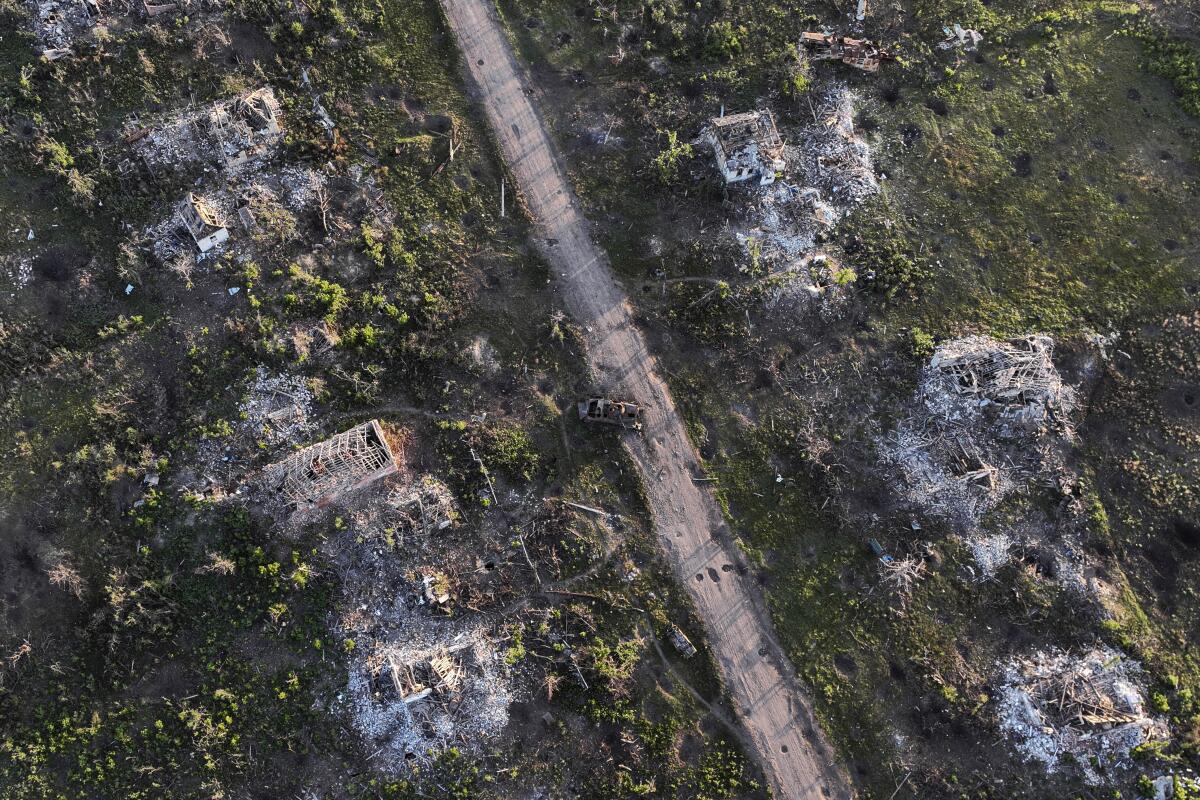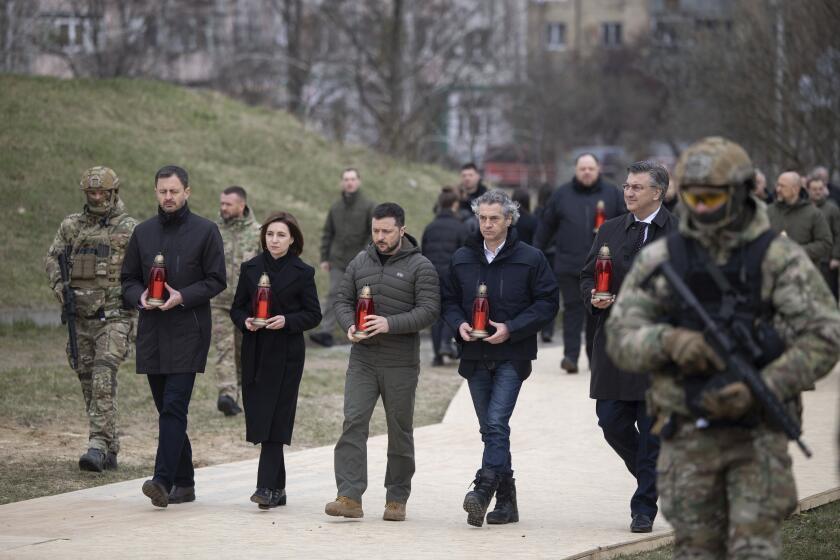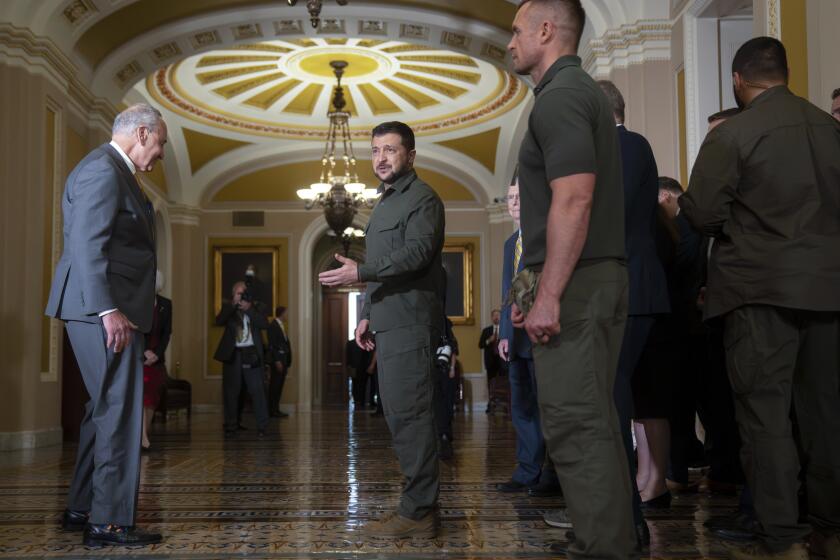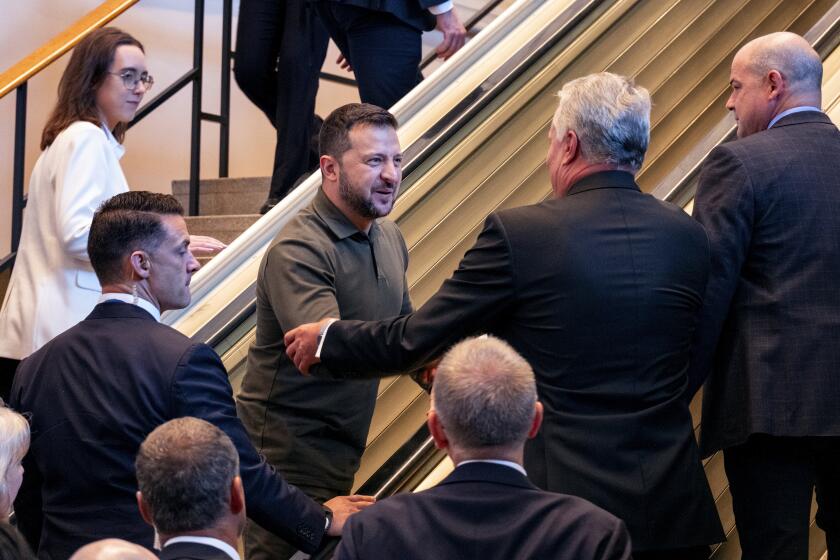Russian drone strikes on Odesa hit port, cut off ferry service to Romania

- Share via
KYIV, Ukraine — Russia struck the Black Sea region of Odesa for a second night in a row in a drone barrage that damaged a warehouse, charred dozens of trucks, injured two drivers and forced the suspension of ferry service to Romania, Ukrainian officials said Tuesday.
Video shot from the Romanian side of the Danube River showed rapid bursts of Ukrainian antiaircraft fire streaking through the night sky, followed by two orange fireballs exploding near the port area. Photos showed burned-out frames of trucks.
Romanian Border Police said ferries were anchored on the Romanian shores of the Danube in Isaccea because of the attacks on Ukraine. Traffic was being redirected through Galati, a Romanian town upstream on the Danube.
Ukraine’s air force said it downed 26 of 38 drones launched by Russia overnight.
Russian forces targeted the area of Izmail in the Odesa region, in what has become a sustained campaign to strike at Ukraine’s ability to export grain. Attacks on Monday killed two people in a grain warehouse in Odesa and badly damaged an abandoned high-rise hotel, officials said.
After Moscow pulled out of a United Nations-brokered grain deal this summer, the strikes on Izmail and cities in the southern part of the Odesa region have become routine. Attacks on cities on the Danube have been especially damaging because the route has emerged as the most promising for continued Ukrainian exports.
Independent U.N.-backed human rights experts say they have evidence of war crimes committed by Russian forces in the fight against Ukraine.
At least nine civilians were killed in Ukraine and 15 people were injured over the last 24 hours, the presidential office reported, as Russian strikes hit several cities near the front lines of the war where Ukraine is waging its slow-moving counteroffensive.
Although neither side has released casualty figures, the counteroffensive is believed to have taken a heavy toll on both sides and has been devastating to the towns and villages where fighting has raged.
New aerial video of Klishchiivka, on the outskirts of Bakhmut, shot with a drone for the Associated Press, shows how the battle has turned the village in eastern Ukraine into a pile of rubble after months of fierce fighting.
The video, shot two days ago, shows the village in ruins with destroyed Russian tanks and military vehicles littering the main road. Barely a building remains intact in the village, which was once home to almost 400 people.
Zelensky’s top priority: Make sure the number of Republicans unwilling to continue funding the war effort doesn’t get any bigger.
The rare structure that still has four walls standing is missing its roof. Single walls stand like tombstones to mark where someone once lived.
Ukraine recaptured the village Sept. 17 after months of fighting, the Ukrainian military said, two days after it said it won back neighboring Andriivka.
Both are tiny towns but were considered tactically important for Ukrainian forces as they extend gains around Bakhmut, six miles to the north.
The commanding heights of the village offer a view into the Russian-occupied city of Bakhmut and open new opportunities for Ukrainian forces to encircle the town. The village also potentially allows Ukrainians a better view of Russian logistics lines.
Even some of Kyiv’s close allies have grumbled that it doesn’t seem sufficiently grateful for the aid it’s received. How thankful is thankful enough?
In other developments, a senior Russian naval officer whom Ukraine claimed to have killed in a missile strike was seen attending an online conference. On Monday, Ukraine had claimed without evidence that its strike on the Crimean headquarters of Russia’s navy last week killed 34 officers, including fleet commander Adm. Viktor Sokolov.
Russia did not comment on that report, but on Tuesday, Sokolov was seen among other senior officers attending a videoconference with Defense Minister Sergei Shoigu.
Responding to news that U.S.-made Abrams tanks had arrived in Ukraine and that the Washington would be sending an unspecified number of long-range ATACMS missiles, Kremlin spokesman Dmitry Peskov said they would have no effect on the battlefield. Dmitry Medvedev, the deputy head of Russia’s Security Council, who often takes a harder line, said the moves would push NATO closer to a direct conflict with Russia.
More to Read
Sign up for Essential California
The most important California stories and recommendations in your inbox every morning.
You may occasionally receive promotional content from the Los Angeles Times.
















